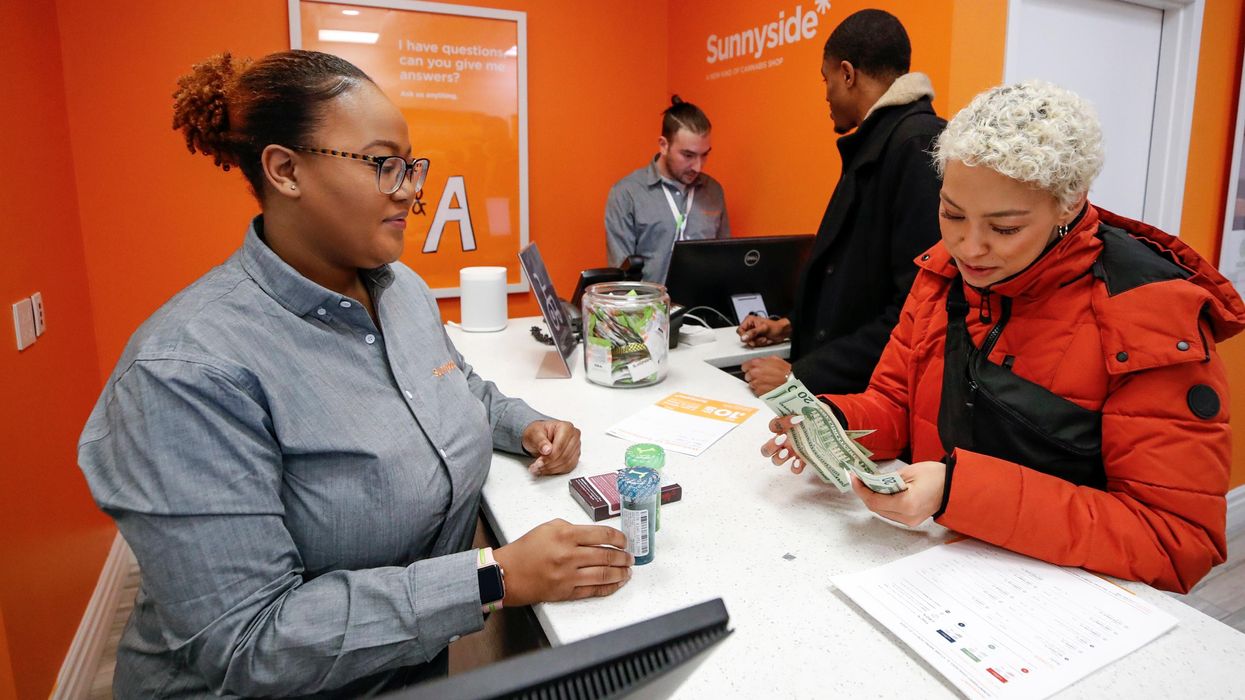As Biden Plans to Reschedule Marijuana, Advocates Say 'Fully Legalize' It
Sen. Cory Booker urged fellow lawmakers to "follow the lead of states around the country and legalize cannabis for adult use and create a comprehensive taxation and regulatory scheme."
U.S. marijuana legalization advocates greeted Tuesday's news that the Drug Enforcement Administration is proposing rescheduling cannabis to a less restrictive class by calling on President Joe Biden to fully deschedule the plant, which is approved for recreational or medicinal use in the vast majority of states.
The Associated Pressreported the DEA is proposing rescheduling marijuana from Schedule I—which includes heroin, MDMA, and LSD—to Schedule III, a far less restrictive class that includes ketamine, anabolic steroids, testosterone, and over-the-counter products containing less than 90 milligrams of codeine per dose. According to the DEA, Schedule I drugs have "no currently accepted medical use and a high potential for abuse."
While it would not legalize cannabis for recreational use, the DEA proposal—which is subject to review by the White House Office of Management and Budget—would affirm medicinal marijuana and recognize that the plant has a lower potential for abuse than other widely used recreational drugs.
The Drug Policy Alliance (DPA)—which works to end the failed 53-year War on Drugs—warned that "under this proposed shift, marijuana criminalization would continue at the federal level and most penalties, including those for simple possession, would continue as long as marijuana remains anywhere on the Controlled Substances Act (CSA)."
While running for president in 2020, Biden repeatedly vowed to decriminalize marijuana and expunge the criminal records of people convicted of cannabis possession. In 2022 the president issued a "full, complete, and unconditional pardon to all current United States citizens and lawful permanent residents" convicted of simple federal marijuana possession—a move that affected thousands of people but excluded those who are in the United States without authorization.
The following year, Health and Human Services (HHS) Secretary Xavier Becerra confirmed that his department would recommend rescheduling cannabis to Schedule III.
Sen. Cory Booker (D-N.J.) on Tuesday urged Congress to "follow the lead of states around the country and legalize cannabis for adult use and create a comprehensive taxation and regulatory scheme."
"Thousands of people remain in prisons around the country for marijuana-related crimes. Thousands of people continue to bear the devastating collateral consequences that come with a criminal record," the senator continued. "Legal marijuana businesses, especially those in communities hardest hit by the War on Drugs, still have to navigate a convoluted patchwork of state laws and regulatory schemes."
"I hope that my colleagues on both sides of the aisle, especially those who represent constituents benefiting from medical or adult-use programs, join me to pass federal legislation to fix these problems," Booker added.
Senate Majority Leader Chuck Schumer (D-N.Y.) said that "it is great news that DEA is finally recognizing that restrictive and draconian cannabis laws need to change to catch up to what science and the majority of Americans have said loud and clear."
"While this rescheduling announcement is a historic step forward, I remain strongly committed to continuing to work on legislation like the SAFER Banking Act as well as the Cannabis Administration and Opportunity Act, which federally deschedules cannabis by removing it from the Controlled Substances Act," he added.
Booker and Schumer were among the 21 senators who last week sent a letter to U.S. Attorney General Merrick Garland and DEA Administrator Anne Milgram noting that it's been 18 months since Biden ordered HHS October to review cannabis scheduling and eight months since the agency's rescheduling recommendation.
"While we understand that the DEA may be navigating internal disagreement on this matter, it is critical that the agency swiftly correct marijuana's misguided placement in Schedule I," the letter states.
Legalization advocates, meanwhile, pushed the Biden administration to go much further, as 24 states plus the District of Columbia have approved adult-use recreational marijuana and 38 states have legalized medicinal cannabis.
"Supporting federal marijuana decriminalization means supporting the removal of marijuana from the Controlled Substances Act, not changing its scheduling," DPA director of drug markets and legal regulation Cat Packer said in a statement. "We all deserve a federal framework for marijuana that upholds the health, well-being, and safety of our communities—particularly Black communities who have borne the brunt of our country's racist enforcement of marijuana laws."
"Rescheduling marijuana is not a policy solution for federal marijuana criminalization or its harms, and it won't address the disproportionate impact that it has had on Black and Brown communities," Packer added.
Dasheeda Dawson, chair of the Cannabis Regulators of Color Coalition and founder of Cannabis NYC, said: "The time for descheduling cannabis is not just a matter of policy; it's an imperative for justice and equity. Rescheduling would undermine the hard-fought progress made by cannabis equity and policy reform leaders like the Cannabis Regulators of Color Coalition, jeopardizing the livelihoods and futures of those entrepreneurs and communities disproportionately affected by past criminalization."
"We cannot afford to backtrack on our commitment to repair the harm inflicted by outdated policies," Dawson added. "Descheduling is not just about legality; it's about rectifying historic injustices and ensuring a fair and inclusive future for all."


